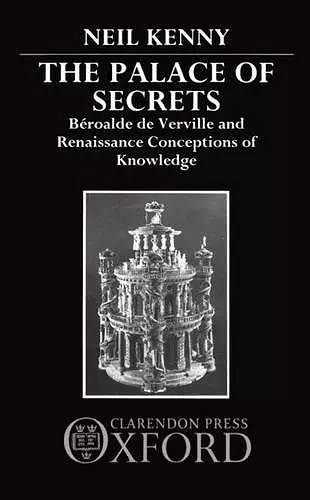The Palace of Secrets
Béroalde de Verville and Renaissance Conceptions of Knowledge
Format:Hardback
Publisher:Oxford University Press
Published:30th May '91
Currently unavailable, and unfortunately no date known when it will be back

During the Renaissance, very divergent conceptions of knowledge were debated. Dominant among these was encyclopedism, which treated knowledge as an ordered and unified circle of learning in which branches were logically related to each other. By contrast, writers like Montaigne saw human knowledge as an inherently unsystematic and subjective flux. The Palace of Secrets explores the tension between these two views by examining specific areas such as theories of knowledge, uses of genre, and the role of fiction in philosophical texts. Examples are drawn from numerous sixteenth- and seventeenth-century texts but focus particularly on the polymath Béroalde de Verville, whose work graphically illustrates these two competing conceptions of knowledge, since he gradually abandoned encyclopedism. Hitherto Béroalde has been mainly known for the extraordinary and notorious Moyen de parvenir; this is the first detailed study of the whole range of his work, both fictional and learned. The book straddles literary and intellectual history, and indeed it demonstrates that the division between the two has little meaning in Renaissance terms. The intellectual conflicts which it explores have significance for the history of thought right up to the Enlightenment.
Kenny's study is thorough, precise, lucid and elegant. ... combines a literary with a philosophical approach to 'erolade's texts ... Kenny's study, which makes unobtrusive use of literary theory, from Bakhtin to Derrida, is very much of the 1990s in its concern with subversion and contradiction ... As Kenny demonstrates ... these were the concerns of the 1590s as well. ... persuasive and perceptive study' * Peter Burke, Times Literary Supplement *
Measured and well-balanced treatment of the writer ... The study is well documented with an impressive European-wide range of reference, its conclusions finely nuanced and well supported. Dr. Kenny has been very well served by his publisher too. Nothing has been skimped in the production of the book which has six illustrations, abundant footnotes, three useful appendices, a full bibliography and index. In short, this is a pleasing and valuable contribution to our knowledge of a period of literary and intellectual history perhaps too often overlooked in the past. * Pauline M. Smith, Hull, D'Humanisme et Renaissance, tome 5, 4 1992 *
Kenny's erudition is impressive, and he offers many rich insights into the intellectual milieu of the late Renaissance, especially in France. His stress on the interrelatedness of philosophy and fiction deserves close attention. * Robin B. Barnes, The Sixteenth Century Journal XXIII/3 92 *
ISBN: 9780198158622
Dimensions: 222mm x 145mm x 24mm
Weight: 541g
318 pages